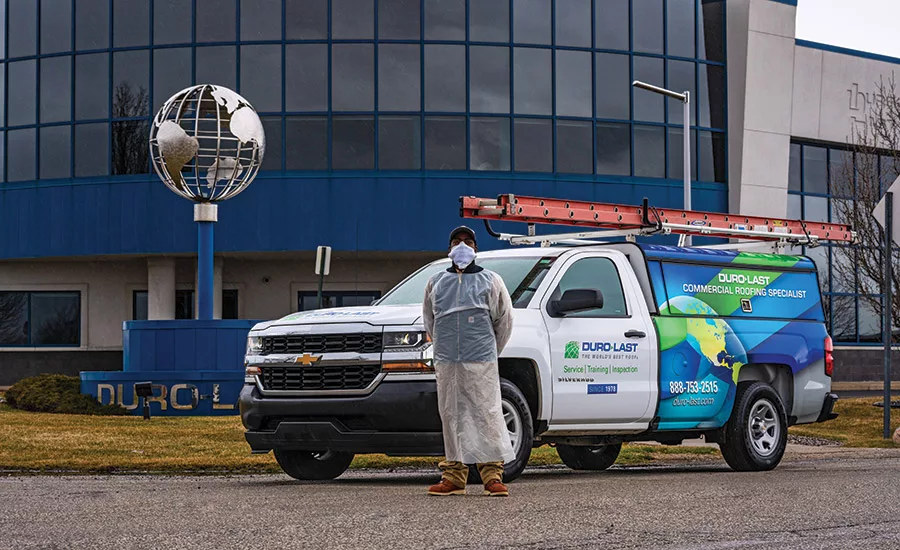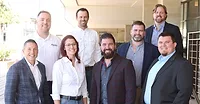Roofing Industry Responded to COVID-19 With an Eye on the Future
Crisis Mode

The roofing industry is settling into the “new normal” in a COVID-19 world.

The roofing industry is settling into the “new normal” in a COVID-19 world.
The roofing industry is settling into the “new normal” in a COVID-19 world.
From manufacturers and suppliers to industry associations and roofing contractors, all segments of the roofing world reported major changes to procedures and operations during what has been a period of rapidly-changing events and mind-numbing uncertainty. The true impact of the unprecedented developments around the world related to the COVID-19 crisis are still unknown, but how different companies, associations and other industry leaders respond now will have a hand in how far and wide-reaching this prolonged health and safety crisis stretches.
Adhering to federal travel and health and safety recommendations, as well as stay-in-shelter orders in several states, the initial impact of the crisis hit the roofing industry in the form of canceled events. With the potentially-deadly COVID-19 disease spread easily between people in close contact, ceasing mass gatherings was the first precautionary step.
Officials with the North/East Roofing Contractors Association (NERCA) officially postponed their annual convention a week before it was scheduled in Atlantic City in March. The 2020 IIBEC International Convention and Trade Show in Houston later that month followed suit. Neither event has been rescheduled.
The National Roofing Contractors Association (NRCA) canceled its annual Roofing Day event in Washington D.C. in April due to the worsening pandemic. The largest annual fly-in event for the roofing industry could not be rescheduled this calendar year, and plans are already underway for March 23-24, 2021. The NRCA also canceled the Diversity + Inclusion Forum 2020 in Washington D.C., and the Roofing Alliance Member Meeting in Sarasota, Fla., later that month. Several in-person training sessions and meetings were canceled, prompting the organization to turn to digital options. It started with a robust website offering information and resources to roofers, and continued with other innovative ways to communicate with members including telephone town halls and multiple video webinars.
NRCA members also spearheaded a national movement to have roofing designated as an “essential business” at the crisis’ onset in order to keep roofing crews working amid stay-in-shelter and shutdown orders imposed by state and local governments. The lobbying of local officials and letter writing campaigns worked, keeping roofers on the job in many states.
Roofers and industry associations weren’t alone in stepping up their digital presence as the pandemic unfolded. Several manufacturers established their own digital tools for roofing contractor customers, and began rolling out instructional videos and webinar series.
Companies like GAF, CertainTeed and Johns Manville started their own COVID-19-related webpages with news updates, insights on government responses, best practices and links to more vital information. Others stepped up their email communications and social media programming to highlight how they’re responding to the crisis and keeping their employees safe while still trying to service contractors around the country.
GAF hosted a trial “work-from-home” day for staff at its headquarters in Parsippany, N.J. roughly a week before the virus forced local governments to issue stay-at-home orders, President Jim Schnepper said. The company also ramped up production in the months before the pandemic spread to North America in anticipation of possible slowdowns caused by the virus’ economic impact.
Schnepper also said plans to release GAF’s first at-home selling app — originally planned for mid-March — pivoted to developing an online version that can put homeowners and roofers at ease when it comes to selling roofs.
Owens Corning implemented robust cleaning procedures, social distancing and employee health screenings in addition to work-from-home requirements at all of its locations. To support contractors, Owens Corning adjusted its Owens Corning University Business Building Days seminars to virtual sessions and created virtual sales kits to distribute to contractors.
“We have to remember there are contractors, small, medium and large, that don’t really have the bandwidth to invest in anything that’s super expensive, so we tried to be cost effective as well as providing the tools and resources in this kit that any contractor could put together,” said Jon Gardner, Owens Corning national training and education leader.
Polyglass USA announced in early April that business was relatively stable and that operations continued at all five manufacturing facilities, barring some adjustments to comply with changing health and safety recommendations. Despite some stress on the supply chain of raw materials, there was little impact on production.
All sales, technical, customer service, marketing and administrative staff started working remotely by the end of March.
JOINING THE FIGHT
Duro-Last and Others Retool From Manufacturing Roofing Products to Medical Equipment Needed on the Front Lines
Michigan-based Duro-Last stepped up to combat the COVID-19 crisis in a big way in late March by retooling manufacturing operations from commercial roofs to much-needed medical equipment. As hospital systems across the country experienced shortages in critical personal protective equipment (PPE) supplies during the pandemic, company officials went to work.
Duro-Last engineers, product development and manufacturing staff united to fabricate and manufacture isolation gowns and face masks. Utilizing expertise in manufacturing flexible PVC and fabrics, the team went from prototype to production to delivery in one week.
The gowns are made from flexible PVC, making them water and fluid-repellant. The masks are washable and reusable, made from polyester and PVC. Duro-Last reformulated products and retooled processes to manufacture these supplies.
“This is about helping health care professionals in any way we can and at the same time keeping people employed,” said Tom Saeli, Duro-Last CEO. “I am very proud of and impressed by the people in our company who quickly developed these products.”
Saeli sits on the board of directors of Beaumont Health, one of the largest hospital systems in Michigan, and made a call to hospital administrators to gauge and target the need quickly.
“We’re a pretty entrepreneurial company and relatively flat organization,” he said of Duro-Last. ”They didn’t have to go through any red tape, they just went ahead and made them over the weekend and people drove them down to (Beaumont Hospital in Metro Detroit) on Monday. They went through some design changes over the next couple of days and we were shipping product by the end of the week.”
He estimated production started at about 1,000 of each product every day, but said given the need, more people and resources would be assigned to ramp up the production process.
Duro-Last joined other Michigan-based companies like Ford and GM that are working with manufacturers to increase the production of much-needed items, like ventilators. Part of their effort was to also inspire other companies inside and outside of the roofing industry to follow suit.
“Our country is full of tremendously smart, entrepreneurial people who can bring timely solutions to this unprecedented need,” said Saeli. “The need is real and I believe it’s our obligation to act now. If the efforts of our team inspire just one other company to join this fight, it will be worth it.”
Sun Coatings, a leader in adhesives, coatings and paint production for nearly five decades, added hand sanitizer to its lineup of construction materials production at its headquarters in Tampa, Fla.
Using FDA approved guidance procedures, company chemists and plant personnel re-purposed areas of their 90,000-square-foot manufacturing facility to produce and distribute hand sanitizer, which has been a scarce commodity in most states since early March. In the first week of production, more than 350 gallons of hand sanitizer were donated to local police, firefighters and military, as well as to schools, churches, hospitals and company employees.
“Having the facilities, staff and access to raw materials, we saw the manufacturing of hand sanitizer as the most appropriate way to benefit our community,” said CEO Michael Hyer. “Through this initiative, we’ve been able to donate to the Tampa Police Department, Tampa Fire Rescue, Hillsborough County Fire Rescue, MacDill Air Force Base, Moffitt Cancer Center and more. Tampa Bay is our home and we’re grateful for another opportunity to contribute.”
Corporate owner Mapei Group, which was impacted heavily when the virus ravaged Italy, vowed to weather the storm and prepared to return to full strength. Closely tied to the city of Milan, the company also donated more than $825,000 to overwhelmed hospitals and fighting the pandemic.
Smaller operations did the same. Lakeside Construction Fasteners sent an email to customers assuring that they’re open for business and taking the appropriate health and safety measures to continue operating. The company also established a landing page on its website to better communicate with customers about their orders.
Like most companies, Eric Velliquette, vice president of sales and marketing, said they scaled back office staff and prepping staff to be fully capable working from home.
Supply Side
Industry suppliers also took proactive steps to ease any fears of order delays or cancellations due to scarce materials. ABC Supply Co. established a webpage with helpful digital tools, government resources and other industry contacts. Company officials instituted a no-contact policy for employees in late March and temporarily restricted access to all 800-plus branches to staff only.
“In a world where many businesses are getting more and more impersonal, something we all love about our industry are the great people we get to meet with every day at our locations across the country,” said COO Mike Jost in a letter announcing the change. “So any effort to limit our interaction with you is not taken lightly, but we feel this is necessary to keep everyone safe.”
The development of its myABCSupply digital program also proved helpful to roofing contractors, allowing 24/7 access to view the status of orders in real time.
SRS Distribution started a webinar series geared toward helping contractors maintain business and hit the ground running after the crisis. The program included company leaders and industry experts, and accompanied videos on how contractors can still meet customers’ needs and prospect safely. While supply disruptions are a reality, the company focus is on what it can control.
“We instead try to use the downtime as an opportunity to help our customers be better prepared for the business when it comes back,” said John DeRosa, director of training and customer experience. “We’ve tried really hard to be a positive voice in this environment — giving our customers and our people the ability to think about and take action on what we want and need to do to add value.”
The company is also touting the next generation of its Roof Hub digital tool. The desktop version, RoofHub.Pro, allows customers to place orders online, and it incorporates Smart Template Technology that looks at the customer’s SRS order history. This helps build their order templates based on the items they order most.
Beacon Building Products quickly reassured contractors concerned about safety and supply lines by issuing revised safety guidelines just as most states closed schools and implemented stay-at-home orders. Beacon also reminded them that the vast majority of products are sourced from Canada and the United States. Working with the NRCA, Beacon also established a video series breaking down business strategies, jobsite safety and other time-sensitive topics.
Through it all, the companies in and supporting the roofing industry took proactive measures to try and leverage the unprecedented circumstances the COVID-19 pandemic created. They also tried to remain positive, reminding employees, customers and their families that they matter, and are part of an industry that will persevere.
“When you think about all the people working now in their homes … the critical nature of what we do, and the times we’re in, kind of align,” Schnepper said. “I couldn’t be more proud to be in a business like this — that has a purpose and is driven to a purpose.”
Looking for a reprint of this article?
From high-res PDFs to custom plaques, order your copy today!









